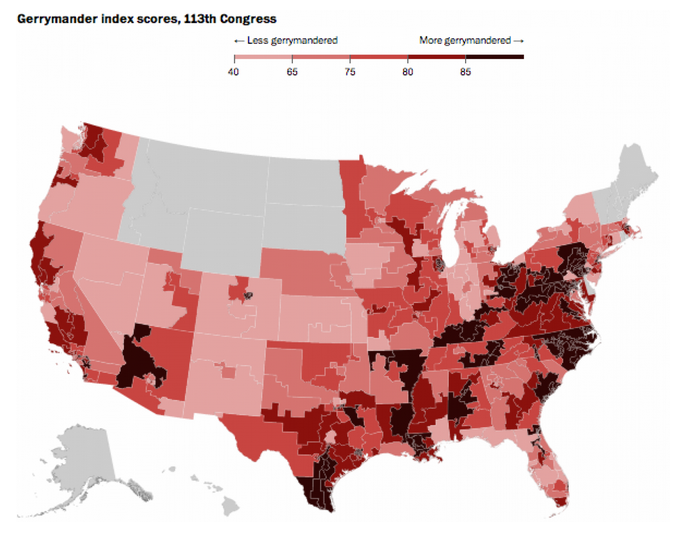INSTITUTE INDEX: Redistricting rulings renew hope for voting rights advocates

The U.S. Supreme Court has ordered North Carolina's high court to revisit a challenge to the state's electoral districts, among the most gerrymandered in the nation. The ruling comes after similar ones on cases from Alabama and Virginia. (Map by the Washington Post; for an interactive version, click here.)
Date on which the U.S. Supreme Court threw out a N.C. Supreme Court ruling upholding Republican-drawn electoral districts for state and congressional lawmakers, ordering the state court to reconsider whether the legislature relied too heavily on race in drawing the districts in violation of the Voting Rights Act: 4/20/2015
Date on which the U.S. Supreme Court issued a similar ruling in a redistricting case brought by the Alabama Legislative Black Caucus, which charged that the state's GOP-controlled legislature also packed black voters into voting districts, diluting their influence while creating safer districts for Republicans: 3/25/2015
Number of days after its Alabama decision that the U.S. Supreme Court sent a case raising similar issues regarding Virginia's 3rd congressional district back to that state for further review: 5
Before North Carolina adopted its controversial redistricting plan after the 2010 census, number of majority-black congressional districts, state Senate districts and state House districts, respectively, in the state: 0, 0, 10
Number under the new redistricting plan: 2, 9, 23
Number of North Carolina's 2,692 voting precincts that the new redistricting plan divided: 563
Percent more likely that black voters are than white voters to live in these split precincts, where neighbors get different ballots and are less able to work together for common political goals: 50
Of the 25 African-American legislators in North Carolina's 2010 General Assembly, number who were elected in districts where black voters were a minority, challenging Republicans' claim that segregating black voters is necessary for them to have a fair chance of electing legislators of their choice: 15
In last year's election, portion of North Carolina's 170 legislative seats that were uncontested: nearly 1/2
Given Democrats' statewide vote share in North Carolina in 2012, number of congressional seats they would be expected to hold: 7
Number they actually won, because many of the state's Democratic voters were concentrated in highly-gerrymandered districts: 4
Of the 10 most-gerrymandered congressional districts in the country, number that are in North Carolina: 3
Since 1980, number of times North Carolina's politician-drawn voting maps have been challenged in court: more than 36
Number of bills introduced in the North Carolina legislature this session to create an independent redistricting process: 2
Number of other states that already take an independent approach to redistricting: 21
(Click on figure to go to source.)
Tags
Sue Sturgis
Sue is the former editorial director of Facing South and the Institute for Southern Studies.
